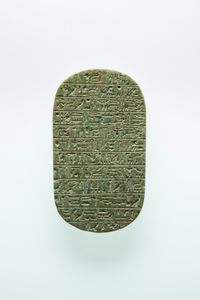
Shabti of the Scribe Huy wearing a Bat-pendant
An item at Metropolitan Museum of Art
Shabtis were small magical figures deposited in a tomb to answer for the deceased should he or she be called upon to do labor in the afterlife. This figure depicts Huy as he was in life: clothed in a fashionable pleated tunic and wraparound shawl and wearing an amulet associated with the goddess Hathor around his neck. His wig is of a type that seems to have been popular with both scribes and military personnel during the late 18th dynasty.
Egyptian Art
An exhibit at Metropolitan Museum of Art
The Met collection of ancient Egyptian art consists of approximately 30,000 objects of artistic, historical, and cultural importance, dating from about 300,000 BCE to the 4th century CE. A signifcant percentage of the collection is derived from the Museum's three decades of archaeological work in Egypt, initiated in 1906 in response to increasing interest in the culture of ancient Egypt.




